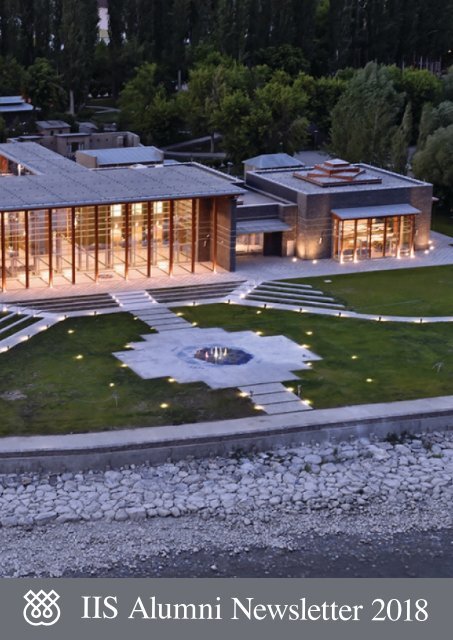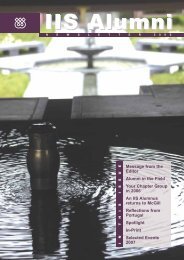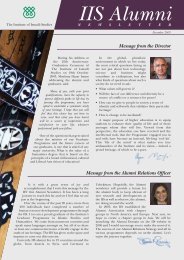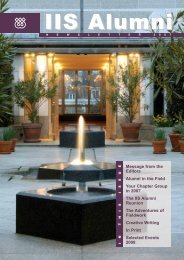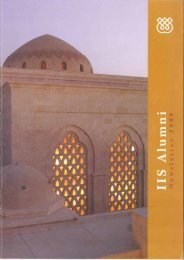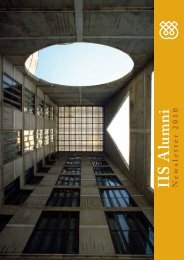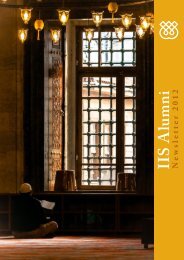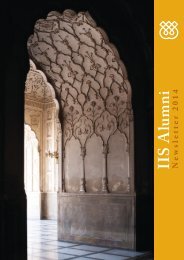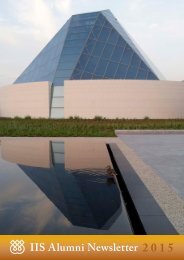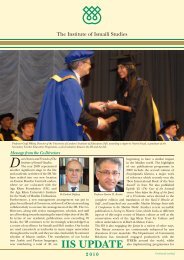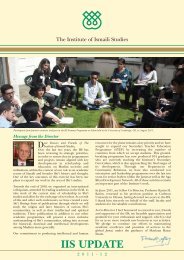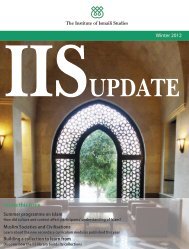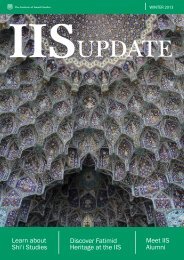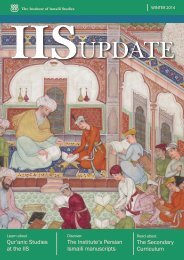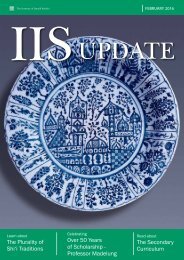IIS Alumni Newsletter 2018
Create successful ePaper yourself
Turn your PDF publications into a flip-book with our unique Google optimized e-Paper software.
<strong>IIS</strong> <strong>Alumni</strong> <strong>Newsletter</strong> <strong>2018</strong>
MESSAGES<br />
2<br />
CONTENTS<br />
Message from the Co-Director 2<br />
Message from the <strong>Alumni</strong> Relations<br />
Coordinator 3<br />
<strong>Alumni</strong> Chapter Group Leadership<br />
for <strong>2018</strong>-2019 3<br />
Global <strong>Alumni</strong> Reunion 4<br />
Highlights from the <strong>Alumni</strong> Profile<br />
Report <strong>2018</strong> 6<br />
<strong>Alumni</strong> Internship Programme 7<br />
<strong>Alumni</strong> Research Grant 8<br />
Scribal Culture in Twentieth-Century Badakhshan:<br />
A Case Study of Mubārak-i Wakhānī 9<br />
Beyond ‘Paradise Gardens’: Productivity<br />
and Environmental Stewardship in the<br />
Aga Khan Garden 10<br />
<strong>Alumni</strong> Publications 12<br />
Publications, Papers, and Presentations<br />
in <strong>2018</strong> 13<br />
MESSAGE FROM THE CO-DIRECTOR<br />
Dear <strong>IIS</strong> <strong>Alumni</strong><br />
In the past year, the <strong>IIS</strong> and its alumni body have had<br />
the pleasure of celebrating some significant milestones.<br />
We moved to our new and permanent premises at the<br />
Aga Khan Centre located in King’s Cross, at the heart<br />
of London’s Knowledge Quarter. Within this beautiful<br />
building is the Aga Khan Library, where we hold a<br />
collection of over 40,000 resources. Membership is open to alumni, so<br />
please apply if you wish to take advantage of our holdings of books and<br />
journals. A number of alumni have offered their time to be tour guides<br />
for the Aga Khan Centre which has helped us deliver tours to members<br />
of the Jamat, special guests, and members of the public. If you are based<br />
in London and wish to contribute your skills, please get in touch with us.<br />
As part of its Diamond Jubilee series of publications, the <strong>IIS</strong> released<br />
the first English translation and a new Persian edition of the Memoirs<br />
of Aga Khan I translated by Dr Daniel Beben and Dr Daryoush<br />
Mohammad Poor. Salvation and Destiny in Islam by Dr Maria De<br />
Cillis provides an in-depth study of how al-Kirmani harmonised his<br />
views with those of earlier renowned Ismaili scholars on issues of<br />
divine preordination and human redemption. Understanding Sharia:<br />
Islamic Law in a Globalised World, by Raficq S. Abdulla and Dr<br />
Mohamed M. Keshavjee, endeavours to fill a long-felt need, both among<br />
Muslims and non-Muslims, for an accessible work that can provide a<br />
better understanding of the workings of shari‘a and its evolving role in<br />
the Muslim world today.<br />
In conjunction with Azimuth Editions, we also produced Islam: An<br />
Illustrated Journey, which I authored with one of our alumni, Professor<br />
Zulfikar Hirji. The book is a timely reminder of Islam’s rich legacy and<br />
pluralistic heritage and takes readers on a visual journey through Islam’s<br />
rich 1400-year history. We launched the publication at the Zee Jaipur<br />
Literary Festival and held events in India with the support of our alumni.<br />
We are grateful that you, our alumni, continue to contribute to the academic<br />
endeavours of the Institute and beyond, whether you are working with us<br />
directly on publications, contributing to academic journals, or publishing<br />
your own books.<br />
In <strong>2018</strong>, we held a conference entitled The Renaissance of Shi‘i Islam in<br />
the 15 th –17 th Centuries: Facets of Thought and Practice which investigated<br />
and evaluated the intellectual contributions of Shi‘i Muslims during this<br />
complex period. In 2019, we anticipate holding a conference on a theme<br />
related to Qur’anic studies, and we will be inviting you to participate in<br />
person or online.<br />
I would like to close by sharing an achievement of the signing of a<br />
Memorandum of Agreement with SOAS. This agreement with SOAS<br />
means that, for the first time since the inception of GPISH, students<br />
who join the programme from September 2019 onwards will receive<br />
two Master’s degrees. SOAS will award an MA in Islamic Studies and<br />
Humanities for the first two years of the programme at the <strong>IIS</strong>. Their<br />
second Master’s degree will be conferred after the completion of their<br />
third year at a UK degree-granting university in a subject area that<br />
resonates with the aims of GPISH. STEP graduates will be awarded an<br />
MA in Muslim Societies and Civilisations by SOAS and a Post Graduate<br />
Diploma in Teaching and Reflective Practice (PGDip) by UCL Institute<br />
of Education. Also, the <strong>IIS</strong> is now registered with the Office for Students,<br />
the independent regulator of higher education in England.<br />
I invite you to stay connected and engaged with us as we continue to explore<br />
and undertake initiatives to support your professional development.<br />
I thank you for your continued support and engagement. With best<br />
wishes for success in all your endeavours.<br />
Dr Farhad Daftary
MESSAGE FROM THE ALUMNI<br />
RELATIONS COORDINATOR<br />
It is with great pleasure and<br />
excitement that I write this message<br />
as the <strong>Alumni</strong> Relations Coordinator.<br />
Like my predecessor, I am committed<br />
to supporting <strong>IIS</strong> alumni in various<br />
stages of their career and professional<br />
development, and to strengthening<br />
their connection with the <strong>IIS</strong> and<br />
various other Imamat institutions.<br />
This issue of the <strong>Alumni</strong> <strong>Newsletter</strong> provides a snapshot<br />
of <strong>Alumni</strong>-related events and activities that have taken<br />
place in <strong>2018</strong> and the contributions of the alumni<br />
community to research and scholarship. One such event<br />
was the Global <strong>Alumni</strong> Reunion which took place in<br />
London 10–12 November <strong>2018</strong>. This celebrated the<br />
40th anniversary of the <strong>IIS</strong> and our move to the Aga<br />
Khan Centre. Bringing together over 160 alumni from<br />
seventeen countries, the Reunion was organised as<br />
an international conference on the theme of ‘Muslim<br />
Renaissance in a Cosmopolitan World: Expressions of<br />
Muslim Identities through Faith, Knowledge and Art.’<br />
Feedback from the alumni who attended the event has<br />
been positive and it will help us organise similar events<br />
in the future more effectively.<br />
The <strong>IIS</strong> <strong>Alumni</strong> Association now comprises over 600<br />
alumni across more than thirty countries. The data on<br />
alumni profile and contributions included in this issue<br />
was obtained through a survey conducted in December<br />
<strong>2018</strong>. I am pleased to report that almost 90% of all<br />
alumni participated in the survey and would like to say<br />
a big thank you to all those who completed the survey.<br />
I hope that you are taking full advantage of the online<br />
<strong>Alumni</strong> Community Portal to stay connected with the<br />
Institute as well as the global alumni community. Those<br />
few alumni who have yet to activate their profiles on<br />
the portal are requested to do so as soon as possible<br />
at https://iisalumni.org. This portal is increasingly<br />
becoming a positive social networking resource and<br />
we are looking to improve it every year. We welcome<br />
feedback and suggestions that will allow alumni to<br />
make full use of the portal’s features. Please get in touch<br />
with us to pass on your recommendations.<br />
If you are visiting London, please do stop by the alumni<br />
office located on the 8th floor of the Aga Khan Centre.<br />
I would love to see alumni and share with them the<br />
latest happenings at the <strong>IIS</strong>. Finally, please be sure to<br />
contact the alumni office at alumni@iis.ac.uk with any<br />
comments, suggestions or questions.<br />
I would like to take this opportunity to welcome new<br />
alumni and wish them the very best as they begin their<br />
careers.<br />
Congratulations!<br />
Sabeen Bashwani<br />
<strong>Alumni</strong> Relations Coordinator<br />
ALUMNI CHAPTER GROUP<br />
LEADERSHIP FOR <strong>2018</strong> – 2019<br />
Chapter Leaders elected for the period September <strong>2018</strong> to<br />
August 2019:<br />
ASIAN CHAPTER GROUP<br />
President: Rami Gargour<br />
Rami is a STEP graduate, Class of 2014,<br />
and works with ITREB UAE as a<br />
STEP teacher.<br />
Secretary: Zohra Surani<br />
Zohra is a STEP graduate, Class of 2014,<br />
and works with ITREB India as a<br />
STEP teacher.<br />
EUROPEAN CHAPTER GROUP<br />
President: Nasreen Hussaini<br />
Nasreen is a GPISH graduate, Class<br />
of 2011, and works as a HR adviser for<br />
Priory Group Healthcare in the UK.<br />
Secretary: Seema Manji<br />
Seema is a STEP graduate, Class of 2012,<br />
and works with ITREB France as a<br />
STEP teacher.<br />
NORTH AMERICAN CHAPTER GROUP<br />
President: Alykhan Velji<br />
Alykhan is a STEP graduate, Class of 2017,<br />
and works with ITREB, Canada as a<br />
STEP teacher.<br />
Secretary: Safeena Keshavjee<br />
Safeena is a STEP graduate, Class of 2016,<br />
and works with ITREB Canada as a<br />
STEP teacher.<br />
CHAPTER GROUP LEADERSHIP<br />
3
GLOBAL ALUMNI REUNION<br />
4<br />
GLOBAL ALUMNI REUNION<br />
During the momentous 40th anniversary year of the <strong>IIS</strong> and its<br />
move to its permanent home at the Aga Khan Centre, alumni<br />
from across the world were invited to a Global <strong>Alumni</strong> Reunion,<br />
held at the Ismaili Centre, London, and the Aga Khan Centre<br />
from 10–12 November <strong>2018</strong>. The reunion brought together over<br />
160 alumni from seventeen countries in Asia, Africa, Australasia,<br />
Europe, and North America. The leadership of the three Chapter<br />
Groups conceptualised the theme of the conference: “Muslim<br />
Renaissance in a Cosmopolitan World: Expressions of Muslim<br />
Identities through Faith, Knowledge and Art”. Over three days,<br />
this international conference allowed the alumni to reflect upon<br />
their roles as educators and intellectuals, and on how to facilitate<br />
change in their respective contexts. A wide array of lectures,<br />
workshops, and seminars were led by scholars, educators, authors<br />
and professionals from a vast range of domains.<br />
The first day opened with Dr Shiraz Kabani sharing recent<br />
developments at the <strong>IIS</strong>, followed by a keynote session on<br />
Positive Pluralism as an Approach to Equality and Diversity<br />
in Religious Education Today by Dr Denise Cush of Bath Spa<br />
University. This was followed by a panel on Religiosity and Civic<br />
Culture, moderated by Dr Shainool Jiwa and comprising three<br />
scholars who presented on related themes. Dr Jones Otterbeck,<br />
from the AKU-ISMC and Lund University in Sweden, shed<br />
light on Active Citizenship among Muslims in European States,<br />
while Ms Yasmin Alibhai-Brown, a prominent journalist and<br />
founder of British Muslims for Secular Democracy, spoke on<br />
Globalisation, Muslims and the Future. Thereafter, Dr Farouk<br />
Topan from the AKU-ISMC shared observations on Muslims<br />
and Civic Culture in Britain. The first day ended with alumni<br />
networking among themselves over tea and live music.<br />
An <strong>Alumni</strong> Symposium was held on the second day, featuring<br />
presentations and discussions primarily led by alumni<br />
showcasing their academic/professional research and expertise.<br />
Over twenty-five alumni presented their work or moderated<br />
panels. In addition, there were two hands-on workshops and<br />
a session on “Muslims Arts and Literature”. The alumni were<br />
given a choice to attend either the “Ebru Painting Workshop” by<br />
Nawaaz Makhani (STEP 2010) and Hafiz Printer (STEP 2011)<br />
or “Calligraphy Workshop” by Soraya Saeed, Calligrapher. They<br />
also had the option of attending a session on “Expressing Muslim<br />
Identities through Arts and Literature” by Mohammed Ali,<br />
Artist and Nadifa Mohamed, Novelist and Lecturer. Throughout<br />
the day, the visiting alumni and their family members were also<br />
given guided tours of the Aga Khan Centre. In the evening, the<br />
alumni were hosted by <strong>IIS</strong> Governors for a celebratory dinner<br />
at the Ismaili Centre, London. Mr Naguib Kheraj, a member of<br />
the Institute’s Board of Governors, delivered an address<br />
which was followed by a musical performance by the Ismaili<br />
Community Ensemble.<br />
The third and last day started with a keynote address by<br />
Dr Aziz Esmail, a member of the Institute’s Board of Governors.<br />
This was followed by a presentation by Mr Aly Mawji from<br />
the Department of Diplomatic Affairs at Aiglemont on the<br />
department’s current and future role in the context of the Seat of<br />
the Ismaili Imamat in Portugal. Mr Micheal Kocher, the General<br />
Manager of the Aga Khan Foundation, spoke on Faith-based<br />
Development Organisations: A Case Study of the AKDN.<br />
The Global <strong>Alumni</strong> Reunion was a rare opportunity for alumni<br />
to reconnect with each other at a meaningful and interactive<br />
platform. Here is what alumni said about the reunion:<br />
“Reconnecting with fellow alumni,<br />
learning from the great work people<br />
are doing, and being motivated to<br />
want to do more.”<br />
“Although challenges are there, we<br />
are the change agents and, hence,<br />
being academic resources of our<br />
institutions, we need to consider<br />
how we can contribute to minimising<br />
the challenges.”<br />
“A sense of connection with the <strong>IIS</strong> and<br />
motivation to work for the community.<br />
Speakers brought new dimensions of<br />
art to understanding Muslim identities,<br />
which was new for me.”
GLOBAL ALUMNI REUNION<br />
5
ALUMNI PROFILE REPORT <strong>2018</strong><br />
HIGHLIGHTS FROM THE ALUMNI<br />
PROFILE REPORT <strong>2018</strong><br />
Presently, the <strong>IIS</strong> alumni body is comprised of 649 graduates<br />
who completed one of the five human resource development<br />
programmes since the early 1980s. A significant majority of<br />
the alumni (499; 77%) are currently employed, with more than<br />
half (320; 64%) in professional employment with AKDN, <strong>IIS</strong><br />
or Ismaili community institutions. Another eighty-six are<br />
contributing (or have contributed in the past) in professional<br />
or voluntary capacities, including through Time & Knowledge<br />
GEOGRAPHICAL DISPERSION OF ALUMNI<br />
Africa 3%<br />
Central Asia 14%<br />
Europe 5%<br />
Far East 1%<br />
Middle East 10%<br />
North America 32%<br />
South Asia 35%<br />
Nazrana. Twenty-four alumni are currently pursuing doctoral<br />
studies, of whom fourteen have received <strong>IIS</strong> scholarships while<br />
the remaining are self-funded or on external scholarships.<br />
During <strong>2018</strong>, twenty-eight students graduated from STEP and<br />
have joined ITREBs in their home countries; eleven students<br />
completed their final year of GPISH; and two alumni completed<br />
their doctoral degrees.<br />
The following charts provide an overview of the profile and<br />
contributions of <strong>IIS</strong> alumni, based on a survey conducted in<br />
December <strong>2018</strong>:<br />
CONTRIBUTIONS TO DIAMOND<br />
JUBILEE PROGRAMMES<br />
Special Projects<br />
and Exhibitions 29%<br />
Operations 14%<br />
Education 46%<br />
Communication and<br />
Coordination 11%<br />
ACADEMIC CONTRIBUTIONS<br />
Total<br />
Other<br />
STEP<br />
GPISH<br />
Received awards<br />
& grants<br />
Published book<br />
Published articles<br />
in journals, chapters<br />
in books, produced<br />
documentaries, curated<br />
exhibitions<br />
Presented papers at<br />
international conferences<br />
0 20 40 60 80 100 120<br />
CONTINUING EDUCATION<br />
Non-degree programme<br />
(certificate or diploma)<br />
GPISH<br />
STEP<br />
Other<br />
Graduate (taught) or<br />
Undergraduate Studies<br />
Doctoral Studies<br />
with <strong>IIS</strong> Scholorhip<br />
Doctoral Studies<br />
(independent)<br />
6<br />
0<br />
10<br />
20<br />
30<br />
40<br />
50<br />
60<br />
70
ALUMNI INTERNSHIP PROGRAMME<br />
Every year, the <strong>Alumni</strong> Relations Unit sets up internships for students graduating from the GPISH programme. These internships<br />
aim to facilitate students’ transition to professional life. In <strong>2018</strong>, with the support of the Department of Jamati Institutions and<br />
AKDN HR, we were able to place five graduates in internship positions as follows:<br />
1. Kiran Rahim with Aga Khan Foundation, Pakistan<br />
2. Nido Guljon with The Institute of Ismaili Studies, UK<br />
3. Gulrukhsor Aknazarova with the University of Central Asia, Tajikistan<br />
4. Semina Halani with The Institute of Ismaili Studies, UK<br />
5. Hasan Alhawat with the Ismaili Council for the UK<br />
Several other alumni were offered internship opportunities but opted to take on more permanent employment opportunities.<br />
We wish all our new alumni best of luck in their endeavours!<br />
REFLECTIONS ON INTERNSHIPS BY ALUMNI<br />
Hasan Alhawat<br />
After completing my Master’s Degree in Politics of Conflicts, Rights and Justice<br />
from SOAS, University of London, I was keen to find an opportunity to work with<br />
the Ismaili Council’s Settlement Steering Group (SSG). I joined the SSG in<br />
December <strong>2018</strong> and am working with the Chair to conduct research and develop strategies<br />
to facilitate settlement and integration of the Newly Arrived Murids (NAMs) within the<br />
jurisdiction of the United Kingdom Council.<br />
I find it professionally satisfying to be part of a team working on initiatives that seek to<br />
reach out to those in need of care and compassion. In addition, I value my work because it<br />
is directly connected to my academic, professional and life passion in contributing to help<br />
those who were forced to leave their countries and find a new home in foreign lands.<br />
The work I do and my place of work at the Aga Khan Centre (AKC) are sources of motivation, interest and happiness for<br />
me. I am always surrounded by hard-working and inspirational professionals with a positive attitude. Working at the<br />
AKC with a great team for a noble cause is a dream come true.”<br />
ALUMNI INTERNSHIP PROGRAMME<br />
Semina Halani<br />
The internship with the Ismaili Special Collections Unit (ISCU) has proven to be an<br />
excellent training opportunity in managing, handling and analysing manuscripts<br />
and rare materials. It has also provided me with an understanding of different<br />
types of manuscripts and their contexts as well as the appropriate ways to deal with them.<br />
Working under the mentorship of Dr Wafi Momin, Head of the Ismaili Special Collections<br />
Unit, has given me the opportunity to develop the critical and analytical skills required<br />
to work with manuscripts. This has been possible through working on different aspects<br />
of Ginān manuscripts, whilst learning about the cataloguing and management of these<br />
materials. As well as building my knowledge and understanding of the kinds of materials<br />
in the <strong>IIS</strong>’ collection, the scholarly environment has motivated me to build my capacity in languages and to make<br />
other intellectual investments. I have been exposed to a wide range of materials in English, Gujarati, Hindi, Urdu<br />
and Khojki, and have also had an opportunity to review different and sometimes quite unusual works from the<br />
Indian subcontinent. The knowledge, skills and experience that I have gained from this internship will work as a<br />
platform on which I can build my academic career.”<br />
7
ALUMNI RESEARCH GRANT<br />
ALUMNI RESEARCH GRANT<br />
The Institute of Ismaili Studies established the <strong>Alumni</strong><br />
Research Grant in 2009. The grant aims to support<br />
alumni who wish to pursue further research, present<br />
research papers at academic conferences, publish articles,<br />
or undertake field studies in areas of relevance to the <strong>IIS</strong>.<br />
In <strong>2018</strong>, the following three alumni received a grant to<br />
present their research at the <strong>2018</strong> Harvard University<br />
International Journal of Arts and Science (IJAS)<br />
Multidisciplinary Conference:<br />
1. Nosheen Hasni, STEP 2017: Co-teaching with Audio-<br />
Visual Resources (AVRs): How do AVRs Impact Students’<br />
Historical Thinking Skills (HTS) in Karachi, Pakistan?<br />
2. Shehzeen Alamir, STEP 2016: Exploring How STEP<br />
Teachers Promote Critical Thinking: A Study in a<br />
Karachi RE Classroom<br />
3. Nisha Khorasi, STEP 2016: Impact of Using Creative<br />
Arts Strategies on Students’ Perceptions of Learning<br />
Literature<br />
REFLECTIONS BY ALUMNI<br />
RESEARCH GRANT RECIPIENTS<br />
Nosheen Hasni<br />
“I feel enlightened, having recently attended the IJAS conference at Harvard Medical School in Boston, USA. The<br />
experience was rewarding in terms of not only attending the conference but being able to present one of my postgraduate<br />
papers. … This multidisciplinary conference provided me with the opportunity to share my research findings both through<br />
the conference podium and IJAS’ double-blind refereed publications, as well as to interact with many academics from<br />
a range of disciplines and countries. … The two off-campus tours to Maine and Plymouth Plantation offered another<br />
learning forum, allowing for personal interaction in an informal setting to discuss different points of view. This facilitated<br />
a lasting research partnership with many international researchers. … This experience has sparked an interest in me to<br />
join in exchanging research and promoting the spirit of research and co-learning.”<br />
Shehzeen Alamir<br />
“The IJAS research conference was a great opportunity of learning. It provided me with a platform to encounter other<br />
researchers and professionals from other countries and institutions. The connections built among professionals and<br />
researchers are likely to become everlasting international research partnerships.”<br />
Nisha Khorasi<br />
“This was my first external research conference, and my first experience of presenting in a multidisciplinary setting. Other<br />
researchers shared very interesting findings from a wide array of fields, including business, technology, religion, science,<br />
health, and more. Coming from an education background, this multidisciplinary conference helped give me exposure to<br />
a wide array of current research. … My main takeaway from participating in this conference was that, as STEP teachers,<br />
we are not so different from the broader field of educators. … As I sat through presentations on engagement, technology<br />
in the classroom, adolescent psychology, and more, I realised that our context and struggles are not so different from<br />
other educational contexts and struggles. While there are some notable differences, we have more in common and can<br />
learn from these diverse educational settings.”<br />
8
SCRIBAL CULTURE IN TWENTIETH-CENTURY BADAKHSHAN: A CASE<br />
STUDY OF MUBĀRAK-I WAKHĀNĪ<br />
Dr Abdulmamad Iloliev, Research Associate, Department of Curriculum Studies, <strong>IIS</strong><br />
Class of GPISH 2002<br />
Scribal activists are a relatively new phenomenon in the remote<br />
mountainous regions of Badakhshan in Central Asia. Divided<br />
into Tajik and Afghan domains, the linguistic landscape of<br />
these regions is dominated by numerous unwritten Pamiri<br />
languages, but for centuries Persian has been the language<br />
of politics, education and literature. Examining the case of<br />
Mubārak-i Wakhānī (d. 1903), an eminent nineteenth-century<br />
mystical poet and scholar who was also a papermaker, scribe<br />
and bookbinder, this study aims to understand how scribal<br />
culture evolved in a predominately oral-tradition oriented<br />
corner of the Persianate world, and to what extent Wakhānī<br />
contributed towards its further growth in terms of production,<br />
distribution and preservation of handwritten texts.<br />
akhānī’s life and thoughts are thoroughly examined in my<br />
monograph: The Ismāʻīlī-Sufi Sage of Pamir: Mubārak-i<br />
Wakhānī and the Esoteric Tradition of the Pamiri Muslims<br />
(2008). Here it suffices to summarise that his intellectual legacy<br />
consists of more than sixteen books of prose and poetry written<br />
in Persian about Sufi mysticism and Ismāʻīlī esotericism. The<br />
themes of his works are similar to those of other mystic poets<br />
with a focus on the divine–human relationship and human efforts<br />
to grow closer to God through love and devotion, worship and<br />
prayer. He also had a good command of the Arabic language<br />
and wrote commentaries on selected verses of the Qur’an.<br />
Some of his major works include Qalb al-Ṣafā’ (‘the Purity of<br />
Heart’), Kalām-i-Saʻādat (‘the Book of Felicity’), Pandnāmayi<br />
Risālat (‘the Book of Prophetic Wisdom’), Kashf al-Ṣalawāt<br />
(‘Unveiling the Prayers’), Ṭālib al-Maṭlūb (‘A Seeker of the<br />
Sought’), Ḥājāt va Munājāt (‘the Needs and Inward Prayers’),<br />
Dāstān-i Tafsīr-i Āyāt-i Kalām dar Ḥaqīqat-i Mujādila-yi<br />
Iblīs va Ādam (‘Qur’anic Commentaries on the Truth about the<br />
Dispute between Satan and Adam’), Risāla-yi Chehel Dunyā<br />
(‘the Forty Worlds’ Treatise’), Qaṭrat al-Baḥr (‘A Drop from<br />
the Ocean’), Tarjamat al-Bayān (‘Clarity of Expression’) and<br />
Dīvān-i Kulliyāt (‘Collection of Poems’). Wakhānī was also<br />
interested in art, calligraphy, music and astronomy – skills which<br />
were well-endorsed by his contemporaries and later generations<br />
of intellectuals. Appreciating Wakhānī’s intellectual capacity<br />
to engage the sciences of his time, the famous Russian scholar<br />
Andrey Bertels called him ‘the Avicenna of Badakhshan’.<br />
Papermaking was one of the most remarkable and challenging<br />
skills that Wakhānī possessed in his economically<br />
disadvantaged context. As his toponym – Wakhānī –<br />
indicates, he came from Wakhan, a remote mountainous<br />
valley, where paper was a very rare and relatively expensive<br />
commodity imported from other parts of Central and South<br />
Asia. Wakhānī had to handmake his own paper on which to<br />
compose his books. According to his relatives, he invented a<br />
mechanical tool called dastgāh-i qāghaz-barār (‘the papermaking<br />
machine’), which consisted of four wooden counters<br />
stuck to a flat four-angled stone with an iron mechanical<br />
tool in the middle and an animal horn serving as a tube for<br />
transmitting the raw materials (e.g., eelgrass, rice, reeds, hair<br />
and apricot twigs) from which the paper was made. Wakhānī’s<br />
relatives believe that this unique machine remained intact in<br />
the private collection of one of his grandsons until 1970–75,<br />
but later it mysteriously disappeared.<br />
It is evident from Wakhānī’s poetry and many of his works<br />
(e.g., Dīvān-i-Kulliyāt) that paper was an essential vehicle for<br />
the preservation and transmission of his ideas and thoughts.<br />
He was preoccupied by the job of making paper and by the<br />
philosophy that he attached to its production. He asserts that the<br />
desire to write enabled him to produce paper, a silent material,<br />
which, once covered with ink, becomes the spokesperson of his<br />
thoughts, a scheme of his mind:<br />
Even if I am not thinking of paper,<br />
My brain is still preoccupied by it.<br />
When I desire to move my pen,<br />
Dozens of silent pages will come to life.”<br />
Wakhānī’s artistic designs are mostly demonstrated in the<br />
various forms of Islamic calligraphy and miniatures presented<br />
in his books and in other objects, for instance, in the ceiling of<br />
a house in his village. He tended to use the two most famous<br />
styles of handwriting in the Muslim world, namely nastaʻlīq<br />
and naskh, designed in multi-coloured frames in which the<br />
poems are printed. The line of a frame, which is usually divided<br />
into four sub-frames, is decorated with vegetable ornaments<br />
of various sorts and shapes. At the top of the first page of<br />
each manuscript, Wakhānī draws a domed frame filled with<br />
the names of Allah, Muhammad and ‘Ali. Under the domed<br />
frame, there is usually a common Islamic expression: “In the<br />
name of God, the Compassionate, the Merciful”. Usually the<br />
first, second and occasionally the third and fourth pages of his<br />
books are decorated. His handwriting is beautifully presented<br />
and contains elements of Islamic art, such as geometric figures<br />
and vegetal ornamentations.<br />
In conclusion, Mubārak-i Wakhānī lived his entire life in the<br />
Pamirs, far away from Central Asia’s main economic and<br />
intellectual centres of his time. Yet he tested his intellectual and<br />
practical abilities by developing new knowledge and skills that<br />
hardly existed in Wakhan before his time, such as papermaking<br />
and scribal art. In addition to inventing a special mechanical<br />
tool to produce paper, he articulated his often-intertwined<br />
Ismaili-Sufi thoughts in the form of ʻirfān poetry. It is believed<br />
that all his books were written on his own hand-made paper,<br />
which tends to be of high quality. Today, some of it is preserved<br />
in his museum-shrine in Tajikistan.<br />
Cover page Mubārak-i Wakhānī’s manuscript, Qalb al-Ṣafā’ (‘the Purity of Heart’)<br />
ARTICLES BY ALUMNI<br />
9
ARTICLES BY ALUMNI<br />
BEYOND ‘PARADISE GARDENS’: PRODUCTIVITY AND ENVIRONMENTAL<br />
STEWARDSHIP IN THE AGA KHAN GARDEN<br />
Aleem Karmali<br />
Class of GPISH 2009<br />
Introduction<br />
This article will reflect on the purpose of Muslim gardens,<br />
arguing that Muslim gardens have historically made positive<br />
and productive contributions to society. In the modern world,<br />
this role can extend to the pressing challenges of environmental<br />
conservation, as seen through the example of the Aga Khan<br />
Garden in Edmonton, Canada.<br />
Gardens of Paradise<br />
One of the common descriptions applied to the diverse gardens<br />
found in Muslim cultures is the term ‘Paradise Gardens’. This<br />
phrase suggests that Muslim gardens are created primarily as<br />
reflections of paradise as described in the Qur’an, in which<br />
paradise is symbolised as a garden. Such an interpretation,<br />
viewed primarily through a religious and social lens,<br />
emphasises the role of gardens as places for pleasure, relaxation<br />
and spiritual reflection on the Divine. Emma Clark summarises<br />
the symbolism of ‘Paradise Gardens’ in this way: ‘Centred on a<br />
spiritual vision of the cosmos, these gardens… mirrors of their<br />
Heavenly counterparts – aim, like all sacred art to draw the<br />
visitor closer to God’. 1<br />
Gardens of Productivity<br />
The historical roots of the Muslim garden tradition lie in the<br />
agricultural need to grow food in the hot, dry climates of<br />
the Middle East. As Muslim empires expanded, the control<br />
and careful use of water to irrigate the land was essential for<br />
survival and prosperity in both rural and urban settings. In rural<br />
contexts, one common garden form was the bustan (orchard),<br />
in which fruits and other crops were grown. What many<br />
people typically think of today as Muslim gardens, such as the<br />
landscape architecture at the Taj Mahal, Humayun’s Tomb, or<br />
the Alhambra, were built as royal gardens by rulers or elites<br />
in society. While serving as a space of pleasure, relaxation<br />
and social interaction, royal gardens also served as important<br />
sites of agricultural growth, botanical research and scientific<br />
innovation. As Andrew M. Watson writes,<br />
Muslim gardens typically offer an engaging aesthetic and<br />
sensory experience, featuring colourful plantings, fragrant<br />
scents, the sounds of running water, and beautiful geometric<br />
and symmetric design elements. Yet, it is important to view such<br />
gardens not only through an aesthetic lens or as a reflection of<br />
spiritual ideals, but to see them as serving multiple functions<br />
motivated by a variety of aims. Although gardens have served a<br />
variety of purposes in Muslim history, one purpose that should<br />
be given attention is gardens as spaces of productivity.<br />
10
By the tenth century, the royal gardens at Cordoba<br />
seem to have become botanical gardens, with fields for<br />
experimentation with seeds, cuttings and roots brought in from<br />
the outermost reaches of the world… Thus, the gardens of the<br />
medieval Islamic world, and particularly the royal gardens,<br />
were places where business was mixed with pleasure, science<br />
with art. By being part of a network, which linked together<br />
the agricultural and botanical activities of distant regions,<br />
they played a role – perhaps one of great importance – in the<br />
diffusion of useful plants.” 2<br />
Environmental Stewardship<br />
One of the great challenges, and most hotly contested issues, of<br />
the twenty-first century is the increasing scale of human impact<br />
on the environment. The need for increased environmental<br />
sustainability to combat climate change and pollution is a<br />
significant concern for many in the world today.<br />
The notion of environmental stewardship is also rooted in<br />
the Islamic faith, as the Qur’an refers to humans as trustees<br />
of Divine creation, and thus Muslims are called upon to leave<br />
the world in a better condition than they inherited it. At the<br />
inauguration ceremony of the Aga Khan Garden in Edmonton,<br />
His Highness the Aga Khan stated that ‘a central part of the<br />
Garden tradition is the high calling of human stewardship, our<br />
responsibility to honor, to protect, and to share the gifts of the<br />
natural world’. 3<br />
Productivity in the Aga Khan Garden<br />
One example of positive contributions to the environment in<br />
modern Muslim gardens is the Aga Khan Garden. It was one<br />
of three garden projects opened in <strong>2018</strong> as part of the Diamond<br />
Jubilee of His Highness the Aga Khan and given as a gift to the<br />
University of Alberta Botanic Garden.<br />
The Aga Khan Garden participates in the historic tradition<br />
of Muslim gardens being sites of productivity in three ways.<br />
First, as part of a university botanical garden, it will be a site of<br />
research, innovation and education for the wider community. In<br />
its educational role, it aims to teach about both wetland ecology<br />
and Muslim culture and design. Second, the garden features a<br />
formal chahar-bagh (four gardens) which connects to a large<br />
pond, around which is an informal bustan with trees that will<br />
grow a variety of fruits. Third, the garden is designed in a way<br />
that it can contribute positively to the local ecology. One of<br />
the province of Alberta’s most pressing conservation issues is<br />
the impact that oil sands mining has on surrounding wetland<br />
infrastructure. As D. Fairchild Ruggles explains,<br />
As a response that encourages remediation and<br />
contributes to wetland restoration, the [Aga Khan]<br />
Garden’s bustan will include diverse native plants in such<br />
abundance that the seed can be gathered to provide stock for<br />
planting new wetlands. In this way, the model of an Islamic<br />
garden… for the twenty-first century is one that engages<br />
actively and beneficially with its environment, whether it be in<br />
Edmonton or Agra.” 4<br />
Conclusion<br />
Muslim gardens not only reflect a spiritual conception of the<br />
life hereafter, but also engage with Islamic ethics in the hereand-now.<br />
Through the example of the Aga Khan Garden, we<br />
can see that Muslim gardens of the twenty-first century can<br />
also contribute positively to the wider society and the pressing<br />
environmental challenges of our day. This is in keeping with<br />
the historic Muslim values of using intellectual resources for<br />
the benefit of others and the importance of being good stewards<br />
of the Divine creation.<br />
ARTICLES BY ALUMNI<br />
1<br />
Emma Clark. “The Symbolism of the Islamic Garden”, Islamic Arts & Architecture, 2 October 2011, http://islamic-arts.org/2011/the-symbolism-of-the-islamic-garden/.<br />
2<br />
Andrew M. Watson. “Gardens of Islam”, Muslim Heritage, http://muslim.heritage.com/article/gardens-islam.<br />
3 <br />
His Highness the Aga Khan. “Inauguration of the Aga Khan Garden, Alberta”, Aga Khan Development Network. University of Alberta Botanic Garden, Edmonton. 16 October <strong>2018</strong>,<br />
https://www.akdn.org/speech/sua-alteza-o-aga-khan/inauguration-aga-khan-garden-alberta.<br />
4<br />
D. Fairchild Ruggles. “An Islamic Garden in Edmonton”, in Heritage of the Mughal World, edited by Philip Jodidio, 267–271. Munich: Prestel, 2015.<br />
11
ALUMNI PUBLICATIONS<br />
ALUMNI PUBLICATIONS<br />
ISLAM: AN ILLUSTRATED<br />
JOURNEY<br />
Dr Farhad Daftary, Professor Zulfikar Hirji<br />
Class of GPISH 1997<br />
Islam: An Illustrated Journey is<br />
a richly illustrated, accessible<br />
account of Islamic history<br />
that gives the reader an<br />
introduction to a faith that<br />
is practised today by over<br />
a billion people whose<br />
traditions and civilisations<br />
are rich and diverse.<br />
Travelling through more<br />
than fourteen hundred years<br />
of history from Islam’s<br />
formative era to its place<br />
in the modern world, the book explores the many social and<br />
cultural landscapes of Arabia, the Mediterranean, the Middle<br />
East, North Africa, sub-Saharan Africa, South Asia, Central<br />
Asia, China, the Americas and Europe where Islam was<br />
adopted and took root.<br />
The book also discusses the historical formation and<br />
development of Islam’s many interpretative traditions and<br />
orientations including Sunnism, Shiʻism, Ibadism and Sufism.<br />
It also covers the diverse social and cultural institutions that<br />
Muslims have built and through which they have expressed<br />
their beliefs and ideas, as well as the numerous artists,<br />
intellectuals and personalities who have contributed to the<br />
story of Islam.<br />
https://iis.ac.uk/publication/islam-illustrated-journey<br />
IDENTITY, HISTORY AND TRANS-<br />
NATIONALITY IN CENTRAL ASIA<br />
Edited by Dr Dagikhudo Dagiev and<br />
Carole Faucher<br />
Class of GPISH 2003<br />
This book provides insights into<br />
the identity process of a group<br />
of mountain communities whose<br />
vigorous cultures, languages and<br />
complex political history have<br />
continued to shape a strategic part<br />
of the world. Its various chapters<br />
capture what being a Pamiri may<br />
entail and critically explore the<br />
impact of both trans-regionalism<br />
and the globalisation processes<br />
on activating, engaging and linking<br />
the dispersed communities. The<br />
book presents a variety of lines of argument pertaining to<br />
Pamiri identity and identification processes.<br />
Structured in three parts, the book first addresses themes<br />
relevant to the region’s geography and the recent history of<br />
Pamiri communities. The second section critically explores<br />
the rich philosophical, religious and cultural Pamiri heritage<br />
through the writings of prominent historical figures. The<br />
final section addresses issues pertaining to the contemporary<br />
diffusion of traditions, peace-building, interconnectivity and<br />
what it means to be a Pamiri for the youth of the region.<br />
Contributions by experts in their field offer fresh insights<br />
into the Ismaili communities in the region while successfully<br />
updating the historical and ethnographic legacy of Soviet<br />
times with present-day scholarship.<br />
https://www.routledge.com/Identity-History-and-Trans-<br />
Nationality-in-Central-Asia-The-Mountain-Communities/<br />
Dagiev-Faucher/p/book/9780815357551<br />
12
PUBLICATIONS, PAPERS AND PRESENTATIONS IN <strong>2018</strong><br />
Adatia, Sh. (<strong>2018</strong>). Equity through Pluralism. Canadian<br />
Society for Studies in Education. https://csse-scee.ca/blog/<br />
equity-through-pluralism/<br />
Alamir, Sh. (<strong>2018</strong>a). Exploring how Secondary Teachers<br />
Promote Critical Thinking. IJAS Conference, Harvard<br />
University.<br />
(<strong>2018</strong>b). Exploring how Secondary Teachers Promote Critical<br />
Thinking. Journal of Teaching and Education (JTE) 8 (2).<br />
Chagani, A. (<strong>2018</strong>). Exploration of the Intersectionality of<br />
Migration, Religious Identity, and Education in a Minority<br />
Muslim Community in Essen, Germany. American Academy<br />
of Religion Conference. Denver, CO.<br />
Dad, Aziz. (<strong>2018</strong>). Nation and Marginal Imagination.<br />
Conference on Plural Asia at International House of Japan,<br />
Tokyo. Japan.<br />
(<strong>2018</strong>b). Prospect of China–Pakistan Economic Corridor.<br />
Karakuram International University, Pakistan.<br />
(<strong>2018</strong>c). Religion, Capitalism and Postmodernity. The News<br />
on Sunday.<br />
(<strong>2018</strong>d). Thinking in the Age of Unthought. The News<br />
on Sunday.<br />
(<strong>2018</strong>e). Liberal Islam and Islamdom. The News on Sunday.<br />
(<strong>2018</strong>f). Dialectics of our History. The News on Sunday.<br />
Dadwani, R. (<strong>2018</strong>a). Implementing Portfolio as a Method<br />
for Student Assessment and Evaluation in the Global<br />
South. 11 th International Conference, AKU Institute for<br />
Educational Development, Karachi, Pakistan.<br />
(<strong>2018</strong>b). Implementation of Student Assessment and Evaluation<br />
in the Context of STEP, Pakistan. <strong>Alumni</strong> Symposium – <strong>IIS</strong><br />
Global <strong>Alumni</strong> Reunion, Aga Khan Centre, London.<br />
(<strong>2018</strong>c). Role of the School Curriculum and Instructional<br />
Pedagogies in Promoting Ethical Values and Empowering<br />
Women. International Journal on Women Empowerment,<br />
Karachi, Pakistan.<br />
Dagiev, D. (<strong>2018</strong>a). Ismailism in Russian, Soviet and Post-<br />
Soviet Studies. The Eighth Biennial Convention of the<br />
Association for the Study of Persianate Societies (ASPS),<br />
Tbilisi, Georgia.<br />
(<strong>2018</strong>b). Book launch of Identity, History and Trans-<br />
Nationality in Central Asia: The Mountain Communities of<br />
Pamir. Routledge, organised by Vostok Society, SOAS.<br />
(<strong>2018</strong>c). Identity, History and Trans-Nationality in Central<br />
Asia: The Mountain Communities of Pamir. Routledge.<br />
(<strong>2018</strong>d). Book Chapter, “Introduction: Locating Pamiri<br />
Communities in Central Asia”, in Identity, History and<br />
Trans-Nationality in Central Asia. Routledge.<br />
(<strong>2018</strong>e). Book Chapter, “Pamiri Ethnic Identity and its<br />
Evolution in Post-Soviet Tajikistan”, in Identity, History<br />
and Trans-Nationality in Central Asia. Routledge.<br />
(<strong>2018</strong>f). Book Chapter, “A Badakhshānī Origin for<br />
Zoroaster”, in Identity, History and Trans-Nationality<br />
in Central Asia. Routledge.<br />
Datoo, A. (<strong>2018</strong>). Contour Cartography: Plotting the Sparks,<br />
Values, and Social Dimensions of Educational Policy.<br />
American Educational Studies Association (AESA).<br />
Daya, H. (<strong>2018</strong>). Did demonetisation accelerate financial<br />
inclusion? Economic and Political Weekly.<br />
Dhamani, Sh. (<strong>2018</strong>). Discoursing Ethical Issues and<br />
Decision-making in Religious Education Centres in<br />
Hyderabad, India. <strong>Alumni</strong> Symposium – <strong>IIS</strong> Global <strong>Alumni</strong><br />
Reunion, Aga Khan Centre, London, UK.<br />
Dossani, Sh. (<strong>2018</strong>). Article on Oral Manifestations<br />
and Dental Management of Patients with Chronic Renal<br />
Failure on Haemodialysis. Journal of the Pakistan Dental<br />
Association.<br />
Faruque Aly, H. (<strong>2018</strong>). Business Models of Social<br />
Enterprises. Subsistence Marketplaces Conference,<br />
University of Illinois-Champaign.<br />
Hayat, P. (<strong>2018</strong>). Lal Das: A Doorway between Various<br />
Communities. <strong>Alumni</strong> Symposium – <strong>IIS</strong> Global <strong>Alumni</strong><br />
Reunion, Aga Khan Centre, London, UK.<br />
Hirji, Z. (<strong>2018</strong>). Islam: An Illustrated Journey. Azimuth<br />
Editions in association with The Institute of Ismaili Studies.<br />
Hunzai, Sh. (<strong>2018</strong>a). Mystic Poetry of Allama Nasiruddin<br />
Nasir Hunzai. National Arts Council Islamabad Spiritual<br />
Music Colours of Karakoram featuring the Poetry of<br />
Allamah Nasir Hunzai.<br />
(<strong>2018</strong>b). Introduction to Rawshnai Nama of Pir Nasir<br />
Khusraw. Pakistan Arts Council Karachi Program in<br />
memory of Allamah Nasiruddin Hunzai.<br />
Iloliev, A. (<strong>2018</strong>). Book Chapter, “The Silk Road Castles<br />
and Temples: Ancient Wakhan in Legends and History” in<br />
Identity, History and Trans-Nationality in Central Asia: The<br />
Mountain Communities of Pamir. Routledge.<br />
Jaffer, K. (<strong>2018</strong>a). Book Chapter, “Evaluating Effects of<br />
Professional Development Course: Imperatives for maximum<br />
returns on investment”, in Lessons from Implementation of<br />
Educational Reform in Pakistan: Implications for Policy and<br />
Practice. Oxford University Press.<br />
(<strong>2018</strong>b). Book Chapter, “Institutional Capacity Building<br />
Initiative: Case Studies of Government Elementary<br />
Colleges of Education”, in Lessons from Implementation of<br />
Educational Reform in Pakistan: Implications for Policy and<br />
Practice. Oxford University Press.<br />
Jiwani, H. (<strong>2018</strong>). Intersectionality of Migration, Religious<br />
Identity, and Education in a Minority Muslim Community<br />
in Essen, Germany. American Academy of Religion (AAR),<br />
Denver, CO.<br />
Kadiwal, L. (<strong>2018</strong>a). Youth Negotiation of Citizenship<br />
Identities in Pakistan: Implications for Global Citizenship<br />
Education in Conflict-Contexts. Comparative Education<br />
Society Europe, Cyprus.<br />
(<strong>2018</strong>b). Youth Negotiation of Citizenship Identities in<br />
Pakistan: Implications for Global Citizenship Education in<br />
Conflict-Contexts. British Journal of Educational Studies.<br />
PAPERS PRESENTATIONS PUBLICATIONS<br />
13
PAPERS PRESENTATIONS PUBLICATIONS<br />
(<strong>2018</strong>c). Book review of Religion and Education:<br />
Comparative and International Perspectives. Compare:<br />
A Journal of Comparative and International Education.<br />
Kara, T. (<strong>2018</strong>). Saving Islam in Africa: Aga Khan III and<br />
Indian Muslims in East Africa. Nations and Minorities.<br />
St. Antony’s College, Oxford.<br />
Karim-Haji, F., Gough, R., Roy, P.A (<strong>2018</strong>a). Holistic Model<br />
for Ethical Mobility Programs. Presented at the 12 th Annual<br />
Global Internship Conference, 12–15 June <strong>2018</strong>, Detroit, MI.<br />
(<strong>2018</strong>b). Ethically-Based (North-South) Undergraduate<br />
Student Mobility Programs in British Columbia. British<br />
Columbia Council for International Education (BCCIE) –<br />
Vancouver.<br />
(<strong>2018</strong>c). Rethinking Global Engagement: Ethical North-<br />
South Student Mobility Programs & Partnerships.<br />
Presentation at the Canadian Bureau for International<br />
Education Conference, Ottawa.<br />
(<strong>2018</strong>d). Expanding Our Understanding of North-South<br />
Mobility Programs: Insights for Improved Institutional<br />
Practice. Journal of Global Citizenship & Equity Education.<br />
Karmali, A. (<strong>2018</strong>a) Documentary film: “Islamic Gardens:<br />
Catalysts for Change,” AKDN: https://www.youtube.com/<br />
watch?v=sWL5doh7wFE.<br />
(<strong>2018</strong>b). Documentary film: “Heritage & Homage: The<br />
Jubilees of the Ismaili Imamat” The.Ismaili: https://www.<br />
youtube.com/watch?v=_isBhF0pDAY.<br />
Keshodkar, A. (<strong>2018</strong>). Marriage as a Means of Exporting<br />
and Importing Women: Mobility and Belonging of South<br />
Asian Women in Zanzibar. Third International AEGIS CRG<br />
Conference on Africa and the Indian Ocean on History<br />
and Politics of Belonging in African Indian Ocean Island<br />
Societies, Halle, Germany.<br />
Khaki, J. (<strong>2018</strong>a). Symbolic Meaning. Dawn newspaper,<br />
Karachi.<br />
(<strong>2018</strong>b). Comparing Faith, Dawn newspaper, Karachi.<br />
(<strong>2018</strong>c). The Heart, Dawn newspaper, Karachi.<br />
Kheraj, Al-A. (<strong>2018</strong>). Three Processes that are Changing the<br />
Digital Landscape. The Exchange.<br />
Khorasi, N. (<strong>2018</strong>). MTeach Report. IJAS Conference,<br />
Harvard University.<br />
(<strong>2018</strong>b). Impact of Using Creative Arts Strategies on<br />
Students’ Perceptions of Learning Literature. Journal of<br />
Teaching and Education.<br />
Merali, A. (<strong>2018</strong>a). Persecution and Partnership:<br />
The Ottomans and the Aga Khan before the Great War.<br />
Rethinking Nationalism, Sectarianism and Ethno-Religious<br />
Mobilisation in the Middle East, University of Oxford.<br />
(<strong>2018</strong>b). “Legitimising Authority: A Muslim Minority under<br />
Ottoman Rule”, in The Shari‘a: History, Ethics and Law,<br />
I.B.Tauris in association with The Institute of Ismaili Studies.<br />
Merchant, K. (<strong>2018</strong>). The Writing Eight Exercise and its<br />
Impact on Kindergartners. Canadian-American Conference<br />
for Academic Disciplines. McGill University, Montreal.<br />
Merchant Hafeez, M. (<strong>2018</strong>a). Planning Local,<br />
Implementing Local. Georgia Association of Teacher<br />
Educators.<br />
(<strong>2018</strong>b). Role of Hair in Indian Tradition. The Second<br />
Biennial – Glorious Hair and Academic Conference.<br />
Mitha, K. (<strong>2018</strong>a). “Rescued by Scotland”? Identity and<br />
Resilience amongst Scotland’s Muslim Community. British<br />
Sociological Association Annual Conference, Northumbria<br />
University.<br />
(<strong>2018</strong>b). Identity, Islamophobia, and Mental Health:<br />
A Qualitative Investigation into Mental Health Needs among<br />
Scotland’s Muslims. Migration, Ethnicity, Race, and Health<br />
World Congress. European Public Health Association.<br />
University of Edinburgh.<br />
(<strong>2018</strong>c). “Prove You can Write”: A Muslim Academic’s<br />
Account of Higher Education Experience. Symposium on<br />
Islam, Muslims, and Education in Britain. Centre for the<br />
Study of Islam in the UK, Cardiff University.<br />
(<strong>2018</strong>d). Sufism and Healing. Journal of Spirituality in<br />
Mental Health.<br />
(<strong>2018</strong>e). Intersectional Spaces of Disabled People of Colour<br />
in Academia. Chronically Academic.<br />
(<strong>2018</strong>f). Culture, Identity, and Mental Health. Forward<br />
Thinking: School of PPLS, University of Edinburgh.<br />
Mithani Malaik, S. (<strong>2018</strong>). STEP Camp Lahore. <strong>Alumni</strong><br />
Symposium – <strong>IIS</strong> Global <strong>Alumni</strong> Reunion, Aga Khan Centre,<br />
London, UK.<br />
Momin, W. (<strong>2018</strong>a). Sir Sultan Muhammad Shah, Aga Khan<br />
III: A Muslim Leader of the Twentieth Century. Pakistan<br />
Society, London.<br />
(<strong>2018</strong>b). From Manuscripts to Printed Texts: The Evolution<br />
of Khojki Script and Literary Production. Conference on<br />
Script, Print, and Letterforms in Global Contexts: The<br />
Visual and the Material, Birmingham City University, UK.<br />
14<br />
Lalani, S. (<strong>2018</strong>). “How Can Philosophical Inquiry be Used<br />
as a Means of Engendering Spirituality”. 10 th International<br />
Conference on Interdisciplinary Social Science Studies,<br />
Oxford.<br />
Mawani, Sh. (<strong>2018</strong>a). Student-Centred Formative<br />
Assessment: The Online Learning Record Sheet. UCL<br />
Education Conference.<br />
(<strong>2018</strong>b). Aga Khan. Encyclopedia of Indian Religions –<br />
Islam, Judaism, and Zoroastrianism.<br />
(<strong>2018</strong>c). Ismailis. Encyclopedia of Indian Religions – Islam,<br />
Judaism, and Zoroastrianism.<br />
Mustafa Noorain, N. (<strong>2018</strong>). Transnational Relationship<br />
between the Ishkashimi Ismailis in Tajikistan and<br />
Afghanistan. International Peace Studies Conference,<br />
Vienna, Austria.<br />
Nanji, Sh. (<strong>2018</strong>). Justice Bertha Wilson Pushes the<br />
Boundaries of Humanity. Self-published. Edmonton.<br />
Nourmamadchoev, N (<strong>2018</strong>). The Ismailis and Itinerant<br />
Darvishes in Shughnan: The Story of Arrival. 43 rd Annual<br />
Meeting of the Social Science History Association, entitled<br />
Histories of Disadvantage: Meanings, Mechanisms, and<br />
Politics, held in Phoenix, AZ.
Punjwani, F. (<strong>2018</strong>a), Religious Education and<br />
Hermeneutics: The Case of Teaching about Islam.<br />
British Journal of Religious Education.<br />
(<strong>2018</strong>b). “‘Islamic’ Education between State and Community:<br />
Frameworks and New Directions”, in J. Berglund, ed.,<br />
European Perspectives on Islamic Education and Public<br />
Schooling. Equinox Publishing.<br />
Pattharwala V. (<strong>2018</strong>a). Partnership in Teacher Education:<br />
Developing Creative Methods to Deepen Students’<br />
Reflections. Journal of Educational Innovation Partnership<br />
and Change.<br />
Qurboneiv A. (<strong>2018</strong>a). The Rise of the Kutama in North<br />
Africa: A Khaldunian Appraisal. World Congress for Middle<br />
Eastern Studies (WOCMES), Spain.<br />
(<strong>2018</strong>b). Book Chapter on “Project Identity: the Discursive<br />
Formation of Pamiri Identity in the Age of the Internet”, in<br />
Identity, History and Trans-Nationality in Central Asia:<br />
The Mountain Communities of Pamir. Routledge.<br />
Rehmani, A. (<strong>2018</strong>). Learning and Assessment in the<br />
Banking Sector. Journal of the Institute of Bankers Pakistan.<br />
Sachedina, A. (<strong>2018</strong>a). “The Ethics of Imagery: Seeing<br />
History Making in the Sultanate of Oman”, Conference<br />
on “Heritage, Decolonization and the Field”, University<br />
College London and German Historical Institute, London.<br />
(<strong>2018</strong>b). Reform and Revolt through the Pen and the<br />
Sword: Ibadi Opposition to British Governance in Oman”,<br />
Conference on Arabic Pasts: Histories and Historiography,<br />
Aga Khan University and SOAS, London.<br />
Sadruddin, N. (<strong>2018</strong>). ‘Co-teaching with Audio-Visual<br />
Resources (AVRs)’ – How Do AVRs Impact Students’<br />
Historical Thinking Skills (HTS) in Pakistan. IJAS<br />
Conference, Harvard University.<br />
(<strong>2018</strong>c). “Domestic and International Mobility: Being<br />
Present and Living in the Present Moment through<br />
Educational Mobility”, in Eurasia on the Move:<br />
Interdisciplinary Approaches to a Dynamic Migration<br />
Region, George Washington University.<br />
(<strong>2018</strong>d). Expanding Education through Local and<br />
International Tajikistani Students in Japan. Journal of<br />
International and Advanced Japanese Studies.<br />
Sunderji, Sh. (<strong>2018</strong>). MA report: Perceptions of Students on<br />
the Curriculum in Tanzania. AKU – Dar es Salaam.<br />
Talbani, A. (<strong>2018</strong>a). Article: Power Discourse and<br />
Educational Policy: Society and the Dilemma of Social<br />
Change. Education and Society.<br />
(<strong>2018</strong>b). Journey with Muhammad: Prophecy in Ismaili<br />
Gnosis. The Axis Press.<br />
Tharani, A. (<strong>2018</strong>). “Religion and Worldviews:<br />
The Way Forward.” Report by Commission on RE:<br />
https://www.commissiononre.org.uk/final-report-religionand-worldviews-the-way-forward-a-national-plan-for-re/.<br />
Virani F. (<strong>2018</strong>a). Facing Humanity: Cultivating the<br />
Levinasian Idea of the Mauvais Conscience in the<br />
Classroom. Canadian Society for the Study of Education,<br />
Congress of the Humanities and Social Sciences, University<br />
of Regina.<br />
(<strong>2018</strong>b). Who am I? The Emotional Situations and Identity<br />
Constructions of Ismaili Muslim Youth. The Qualitative<br />
Analysis Conference, St. Thomas University.<br />
(<strong>2018</strong>c). The Emotional Situation of Education. Rosa Bruno<br />
Jofre Symposium, Queen’s University.<br />
(<strong>2018</strong>d). Review of Jen Gilbert, Sexuality in School: The<br />
Limits of Education. Canadian Journal for New Scholars in<br />
Education.<br />
PAPERS PRESENTATIONS PUBLICATIONS<br />
Saidula, A. (<strong>2018</strong>a). “The Tajiks of China: Identity in the Age<br />
of Transition”, in Identity, History and Trans-Nationality in<br />
Central Asia: The Mountain Communities of Pamir. Routledge.<br />
(<strong>2018</strong>b). Translation into Uyghur of S.F. Starr, Lost<br />
Enlightenment: Central Asia’s Golden Age from the Arab<br />
Conquest to Tamerlane. Uyghur Language Research Press.<br />
Sajwani, N. (<strong>2018</strong>). Halal Medicine: Interpreting Islamic<br />
Law in Malaysia. Conference on Medicine & Religion –<br />
Durham, NC.<br />
Savani, Sh. (<strong>2018</strong>a). Confronting Islamophobia through<br />
Social Work Education. Council on Social Work Education,<br />
Orlando, FL.<br />
(<strong>2018</strong>b). Suicide in Central Asia: Risk and Protective Factors.<br />
<strong>IIS</strong> Global <strong>Alumni</strong> Reunion, Aga Khan Centre, London, UK.<br />
Sodatsayrova N. (<strong>2018</strong>a). Domestic and International<br />
Mobility: Being Present and Living in the Present Moment<br />
through Educational Mobility. Kazakhstan Nazarbaev<br />
University and George Washington University.<br />
(<strong>2018</strong>b). “A ‘Shift’ in Values: Parents’ Educational Role<br />
in the Gorno-Badakhshan Region”, in Identity, History<br />
and Trans-Nationality in Central Asia: The Mountain<br />
Communities of Pamir. Routledge.<br />
Yaziji, M. (<strong>2018</strong>). Identity-building at the Zanzibari Coast.<br />
BARAZA Swahili Studies Conference at SOAS.<br />
Yormamadov, H. (<strong>2018</strong>). The Skill of Teaching. Omuzgor<br />
(Official newspaper of the Ministry of Education of<br />
Tajikistan).<br />
Zeir, U. (<strong>2018</strong>). Kharita: Letter Dispatching at the Court of<br />
Amir Abdul Rahman Khan, Amir of Afghanistan. Central<br />
Asian Seminar Group Meeting, Institute of Archaeology,<br />
UCL, London.<br />
Zoolshoev, M (<strong>2018</strong>a). Farghgána. Encyclopaedia Islamica.<br />
(<strong>2018</strong>b). “Forgotten Figures of Badakhshan: Sayyid Munir<br />
al-Din Badakhshani and Sayyid Haydar Shah Mubarakshahzada”,<br />
in Identity, History and Trans-Nationality in Central Asia:<br />
The Mountain Communities of Pamir, Routledge.<br />
15
ACKNOWLEDGMENTS:<br />
Front Cover:<br />
Evening view of the Ismaili Jamatkhana and Centre, Khorog.<br />
Image credit: The.Ismaili<br />
Page 2:<br />
Dr. Daftary, Co-Director of The Institute of Ismaili Studies.<br />
Image credit: <strong>IIS</strong><br />
Page 3:<br />
Sabeen Bashwani, <strong>Alumni</strong> Relations Coordinator at The Institute<br />
of Ismaili Studies. <strong>Alumni</strong> Association Chapter Group Leadership,<br />
<strong>2018</strong>–2019.<br />
Image credit: <strong>IIS</strong><br />
Page 4 – 5:<br />
Global <strong>Alumni</strong> Reunion<br />
Image Credit: Riaz Kassam & Team<br />
Page 6:<br />
Hasan Alhawat, Semina Halani<br />
Image Credit for Semina Halani: Nurmamadsho Nurmamadshoev<br />
Page 8:<br />
Cover page of Mubārak-i Wakhānī’s manuscript, Qalb al-Ṣafā‘<br />
(‘the Purity of Heart’), a lyrical poem composed in 1310/1893.<br />
Image Credit: Image credit: Nosheen Hasni, Shaheena Alamir,<br />
Nisha Khorasi<br />
Page 10:<br />
Top Image: View along the Nahr to the Talar at dusk, Aga Khan<br />
Garden, Edmonton, Canada<br />
Image Credit: Jeff Wallace / Courtesy of Aga Khan Trust for Culture<br />
Bottom Image: Wetland Seed Banks and the Mahtabi<br />
Image Credit: Jeff Wallace / Courtesy of Aga Khan Trust for Culture<br />
Page 11:<br />
Water flows over the Chinikhana<br />
Image Credit: Jeff Wallace / Courtesy of Aga Khan Trust for Culture<br />
Page 12:<br />
Book cover for Islam: An Illustrated Journey<br />
Publisher: Azimuth Editions in association with The Institute of<br />
Ismaili Studies<br />
Book cover for Identity, History and Trans-Nationality in<br />
Central Asia<br />
Publisher: Routledge<br />
Back Cover:<br />
View down the central axis (Nahr) and past the Chahar-Bagh to the<br />
Bustan – Aga Khan Garden Edmonton, Canada.<br />
Image Credit: Jeff Wallace / Courtesy of Aga Khan Trust for Culture<br />
Special thanks to Eleanor Payton and Malika Pallaeva<br />
Designed by Stephanie de Howes, Sabeen Bashwani, and Hussain Daya<br />
Published by the <strong>Alumni</strong> Association of The Institute of Ismaili Studies


